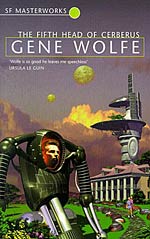
![]() Sable Aradia
Sable Aradia
4/25/2016
![]()
There have been quite a lot of reviews of this book on Goodreads, so I think I'll make mine brief.
This was a brilliantly written book in which three novellas -- one a gothic horror novella about cloning, another a dreamscape fantasy novella of an alien world, the third being an almost Kafkaesque story of totalitarian imprisonment and suffering -- interconnect. This is pure literary science fiction, in which the plot is not the point, but the theme, and that theme is Colonialism, racism, and institutionalized Colonialism and racism, and the role of identity and memory.
The protagonist of the overarching story is an anthropologist named John V. Marsch, though he never once is the viewpoint character, except by proxy in the final story through scattered and deliberately disordered journal entries. He might be descended from the aboriginal race (or races) of the twin worlds of Sainte Anne and Sainte Croix. It is generally accepted that there was at least one, and possibly more than one, aboriginal race of shapechangers who took on human forms when the human colonists came; and it is generally accepted that the humans wiped them out. However, Veil's Hypothesis, which was invented by one of the incidental characters you encounter, suggests that the indigenous race forgot they were ever of another race, so they have intermingled among humans and the only real difference is that they have bright green eyes and they can't use tools well. This is further complicated by a belief of the aboriginal peoples in a race called the Shadow People, who once used tools but don't anymore, and who can manipulate thoughts and dreams. And they may once have been humans in an ancient first wave of colonization that has been long forgotten.
You will find none of this explained in the story, by the way. These details are gleaned from reading between the lines in the process of the existing stories to form all the pieces of the puzzle.
What it has to say about identity, memory and Colonialism is brilliant and thought-provoking. How memory is unreliable. How Colonial arrogance leads to a sociopathic lack of empathy and the cheapening of human life. How institutionalized racism creates unwarranted and irrational distrust in people. How it leads to the persecution of a class of people which is cloaked in "righteousness." How identity depends a great deal on not only genetics and experience, but on one's personal narrative. How truth depends greatly upon one's point of view.
The writing is also brilliant. The language is amazing, and the clever, interweaving plot elements are mind-boggling. I will probably have to read it again just to pick up on all the subtle nuances I missed the first time around.
So why did I only give it a three rating? Well, to be blunt about it, I was not intending to read poetry; I was reading a novel. I found that Wolfe was so concerned with his theme and the unfolding puzzle that I could get invested in none of the characters and none of the plots, with the exception of the second story, which had the character acting in such a bewildering way at the end of it that I'm still not sure I know what really happened. In general the novel left me with a feeling of confusion and dissatisfaction. So, it was great writing, yes. But did I really enjoy it? I feel a little bit like the morning after from the time when I discovered alcohol-soaked parties in the SCA in my youth. I'm *told* I had a good time. My face hurts from smiling and my throat is hoarse from yelling and laughing. But if that's true, why does my head hurt and why is there such a bad taste in my mouth?